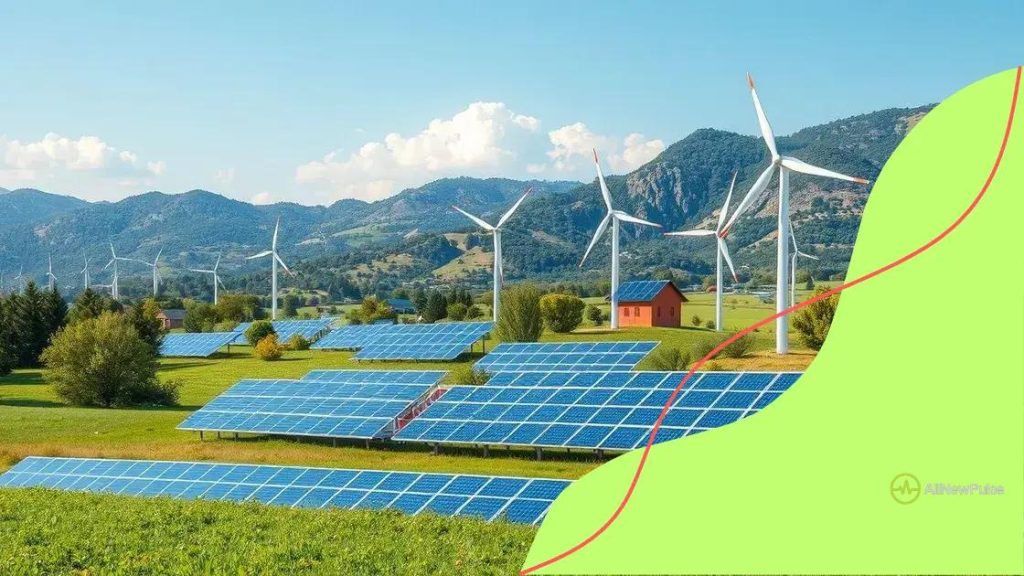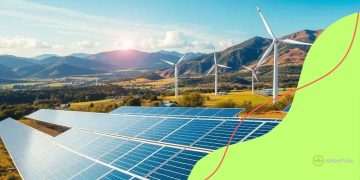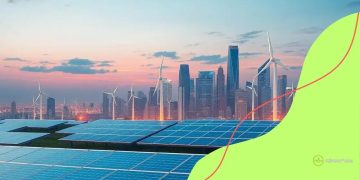The future of energy production and consumption is here

Energy efficiency is vital for reducing energy consumption, lowering utility costs, and minimizing environmental impact by using less energy while maintaining comfort and effectiveness in homes and businesses.
The future of energy production and consumption is rapidly evolving, and it’s fascinating to see how innovative solutions are reshaping our energy landscape. Have you ever considered what this means for your daily life and the environment?
Emerging technologies in energy production
Emerging technologies in energy production are reshaping how we harness and utilize energy. New methods are not only becoming more efficient but also more sustainable. Innovations like advanced solar panels and wind turbines are paving the way for a greener future.
Innovations in Solar Energy
Solar energy technology has seen remarkable advancements. Photovoltaic cells are now more powerful and cost-effective than ever. Tracking solar panels can maximize efficiency by following the sun’s path throughout the day.
- Enhanced energy conversion rates
- Integrative battery storage solutions
- Community solar projects boosting accessibility
With these innovations, solar energy is becoming an essential part of our energy portfolio.
Advancements in Wind Technology
Wind energy technologies are also evolving. Newer turbines are larger, capturing more wind and producing greater amounts of energy. Offshore wind farms are gaining traction, taking advantage of steady coastal winds. These advancements help reduce our dependence on fossil fuels.
- Improved aerodynamic designs
- Big data for optimal placement
- Integration with local grids
As we explore these technologies, it’s clear they play a vital role in the future of energy production.
Additionally, other areas like biomass and geothermal energy are making significant strides. Biomass energy utilizes organic materials, while geothermal energy taps into the earth’s heat. Both options offer promising solutions to our energy needs.
In conclusion, the ongoing evolution of energy production technologies highlights the importance of transitioning to a sustainable energy future, ensuring we meet both current and future demands without compromising our planet.
The role of renewable sources
The role of renewable sources in our energy landscape is crucial for building a sustainable future. These sources provide an alternative to fossil fuels and help combat climate change. With growing awareness of environmental issues, the use of renewables has become more popular.
Key Renewable Energy Sources
Solar, wind, hydropower, and geothermal energy are some of the primary renewable sources contributing significantly to energy production.
- Solar energy harnesses sunlight using solar panels, converting it into electricity.
- Wind energy generates power through wind turbines, utilizing the natural flow of air.
- Hydropower relies on flowing water to produce energy through dams.
- Geothermal energy taps into the Earth’s heat for consistent and reliable power.
Each of these sources has its advantages, making them essential in reducing our carbon footprint.
Benefits of Using Renewable Energy
The use of renewable energy comes with multiple benefits. First, it significantly reduces greenhouse gas emissions, supporting cleaner air and healthier communities. Also, as more renewable projects are developed, jobs are created in manufacturing, installation, and maintenance.
Additionally, renewable sources are abundant and infinite, unlike fossil fuels. This means they can provide energy in the long term without depleting resources. Moreover, as technology advances, the efficiency of these renewable sources continues to improve, making them more cost-effective.
Investing in these clean technologies also leads to energy independence. By utilizing resources available locally, countries can reduce reliance on imported fuels, enhancing their energy security.
The movement toward renewable energy represents a significant shift in how we produce and consume power. Embracing this transition not only shapes a cleaner environment but also ensures a stable and sustainable energy future for generations to come.
Impact of energy storage solutions

The impact of energy storage solutions is pivotal in enhancing the efficiency and reliability of renewable energy systems. As we rely more on sources like wind and solar, which can be unpredictable, storage solutions help balance supply and demand.
Types of Energy Storage Solutions
There are several types of energy storage technologies available today. Batteries, pumped hydro, and compressed air energy storage are among the most common methods employed.
- Batteries: Lithium-ion batteries dominate the market, providing quick and efficient energy storage for homes and businesses.
- Pumped Hydro: This method uses water reservoirs to store energy, pumping water uphill when energy is plentiful and releasing it to generate electricity when needed.
- Compressed Air: This technology uses excess energy to compress air, which is then released through turbines to generate power.
Each of these solutions has distinct advantages, making them suitable for various applications.
Benefits of Energy Storage
Energy storage enhances the stability of the grid by providing backup power during outages. This ensures that homes and businesses remain powered, even when renewable sources are non-operational. Moreover, storages allow for excess energy generation during peak times to be saved for later use, thus optimizing energy consumption and efficiency.
Another significant benefit is the reduction of energy costs. By storing energy during off-peak hours when prices are low, consumers can save money on their utility bills. This creates a more economical energy landscape where businesses and homeowners can take control of their energy expenses.
Energy storage not only supports a cleaner environment but also transforms the way we produce and consume power. As technology advances, we can expect even more innovative solutions to emerge, further expanding the potential of renewable energy.
Consumer behavior and energy consumption
Consumer behavior plays a significant role in energy consumption patterns. Understanding how people use energy is essential for developing effective strategies to promote sustainability. Many factors influence consumer choices, from personal values to economic conditions.
Factors Influencing Consumer Energy Choices
Awareness of environmental issues is rising, leading many consumers to seek out sustainable energy options. They often prefer renewable sources when making energy choices. Additionally, economic factors, such as utility costs, can motivate consumers to reduce energy usage or switch to more efficient appliances.
- Local incentives like rebates for solar panels
- Access to smart home technology for energy monitoring
- Availability of renewable energy options from utilities
These elements can significantly impact how consumers engage with their energy usage.
The Shift Towards Sustainable Practices
Many consumers are making efforts to adopt more sustainable practices. This could involve simple steps like turning off lights or using energy-efficient bulbs. Moreover, some households are investing in solar energy systems or smart home devices to optimize their energy use.
The growing trend of energy-conscious living is driven by both environmental concerns and the desire to save money. Energy-efficient appliances and smart thermostats are becoming more common as families aim to cut energy costs.
As consumers become more informed, their behavior is shifting, positively affecting energy consumption in many areas. This change helps decrease demand for fossil fuels and supports the transition to a renewable energy future. With increased education and access to cleaner energy options, the potential for sustainable consumption continues to grow.
The importance of energy efficiency
The importance of energy efficiency in today’s world cannot be overstated. It plays a crucial role in reducing energy consumption while lowering costs for consumers. By using less energy, we can also decrease greenhouse gas emissions, supporting a healthier planet.
Benefits of Energy Efficiency
Improving energy efficiency offers numerous advantages. It not only saves money on utility bills but also extends the lifespan of appliances and reduces the overall demand for energy.
- Cost Savings: Energy-efficient appliances use less electricity, leading to lower monthly bills.
- Environmental Impact: Less energy consumption means reduced fossil fuel use, helping combat climate change.
- Increased Comfort: Energy-efficient homes maintain stable temperatures while improving air quality.
By focusing on these benefits, energy efficiency becomes an attractive choice for many households.
Ways to Improve Energy Efficiency
There are several practical ways to improve energy efficiency in homes and businesses. Simple steps can make a significant difference.
Switching to LED bulbs is one of the easiest changes, as they use up to 80% less energy than traditional incandescent bulbs. Additionally, regular maintenance of heating and cooling systems ensures they operate efficiently. Installing smart thermostats can also help manage energy use more effectively.
Another approach involves using energy-efficient appliances, which are designed to consume less energy while providing the same services. Choosing appliances with the Energy Star label guarantees they meet strict efficiency guidelines, providing further assurance of their benefits.
Overall, prioritizing energy efficiency is essential for both economic reasons and environmental sustainability. The shift towards efficient energy use is vital for creating a sustainable future while protecting our resources.
FAQ – Frequently Asked Questions about Energy Efficiency
What are energy-efficient appliances?
Energy-efficient appliances use less energy to perform the same tasks, helping to lower electricity bills and reduce environmental impact.
How can I improve my home’s energy efficiency?
To improve energy efficiency, you can switch to LED bulbs, use smart thermostats, and invest in energy-efficient appliances.
What are the benefits of energy efficiency?
The benefits include cost savings on utility bills, reduced greenhouse gas emissions, and increased comfort in your home.
Why is energy efficiency important for the environment?
Energy efficiency reduces the demand for fossil fuels, lowers carbon emissions, and helps combat climate change, contributing to a healthier planet.





